YouthPolicyPractice
- 格式:pdf
- 大小:20.66 KB
- 文档页数:2
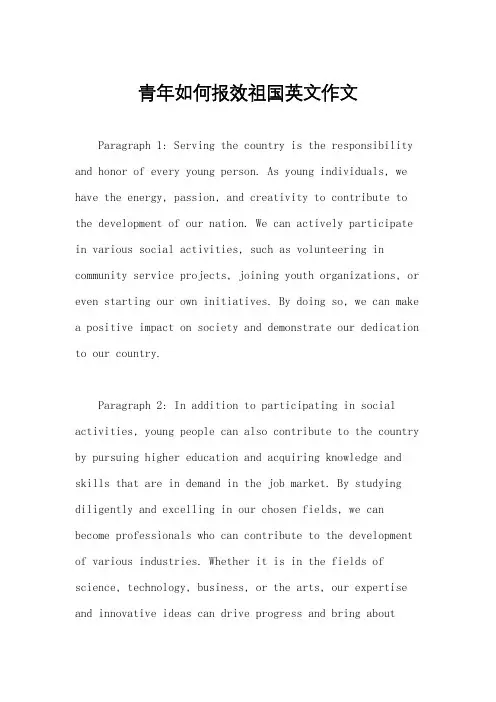
青年如何报效祖国英文作文Paragraph 1: Serving the country is the responsibility and honor of every young person. As young individuals, we have the energy, passion, and creativity to contribute to the development of our nation. We can actively participate in various social activities, such as volunteering in community service projects, joining youth organizations, or even starting our own initiatives. By doing so, we can make a positive impact on society and demonstrate our dedication to our country.Paragraph 2: In addition to participating in social activities, young people can also contribute to the country by pursuing higher education and acquiring knowledge and skills that are in demand in the job market. By studying diligently and excelling in our chosen fields, we can become professionals who can contribute to the development of various industries. Whether it is in the fields of science, technology, business, or the arts, our expertise and innovative ideas can drive progress and bring aboutpositive change.Paragraph 3: Another way for young people to serve the country is by actively engaging in politics and public affairs. We can educate ourselves about current issues, voice our opinions, and participate in discussions and debates. By staying informed and expressing our views, we can contribute to the democratic process and help shape the policies and decisions that affect our country. Moreover, we can also consider running for public office, becoming policymakers, and working towards creating a better future for our nation.Paragraph 4: As young people, we can also contribute to the country by being responsible and law-abiding citizens. We can obey laws and regulations, pay our taxes, and respect the rights and freedoms of others. By being responsible members of society, we can help maintain social order and harmony. Additionally, we can also promote social values such as equality, tolerance, and inclusivity, and work towards creating a more inclusive and harmonious society.Paragraph 5: Lastly, young people can serve the country by being environmentally conscious and taking actions to protect the environment. We can adopt sustainable practices in our daily lives, such as reducing waste, conserving energy, and promoting recycling. By being environmentally responsible, we can contribute to the sustainability of our country and ensure that future generations can enjoy a clean and healthy environment.In conclusion, there are various ways for young people to serve their country. Through active participation in social activities, pursuing higher education, engaging in politics, being responsible citizens, and protecting the environment, we can make a positive impact on our nation and contribute to its development. It is our duty and privilege to contribute to the betterment of our country and create a brighter future for all.。
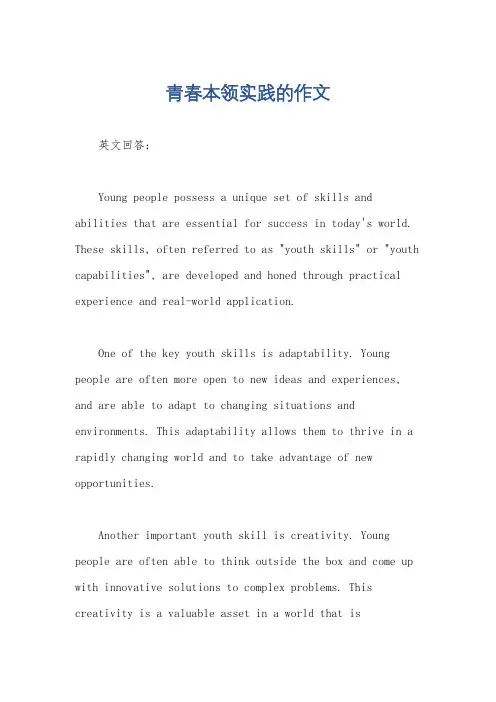
青春本领实践的作文英文回答:Young people possess a unique set of skills andabilities that are essential for success in today's world. These skills, often referred to as "youth skills" or "youth capabilities", are developed and honed through practical experience and real-world application.One of the key youth skills is adaptability. Young people are often more open to new ideas and experiences, and are able to adapt to changing situations and environments. This adaptability allows them to thrive in a rapidly changing world and to take advantage of new opportunities.Another important youth skill is creativity. Young people are often able to think outside the box and come up with innovative solutions to complex problems. This creativity is a valuable asset in a world that isconstantly evolving and facing new challenges.In addition to adaptability and creativity, young people also possess strong technological skills. Growing up in a digital age, young people are often very comfortable with technology and are able to quickly learn and adapt to new digital tools and platforms.Overall, the practical skills and abilities that young people possess are essential for success in today's world. By harnessing these skills and gaining real-world experience, young people can make a significant impact and contribute to positive change in their communities and beyond.中文回答:青年人拥有一套独特的技能和能力,这些技能对于在当今世界取得成功至关重要。
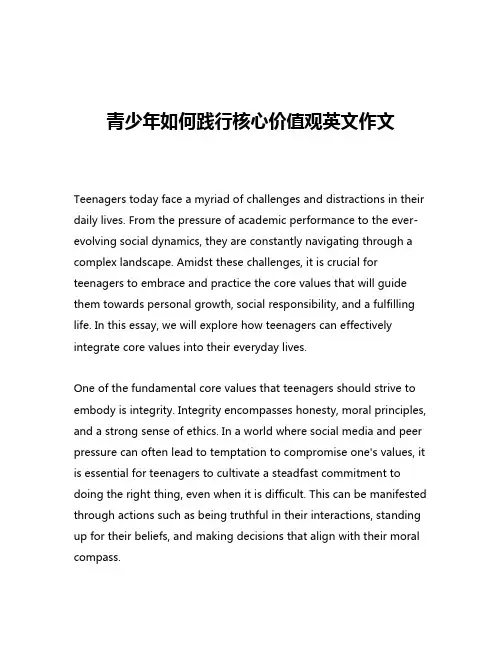
青少年如何践行核心价值观英文作文Teenagers today face a myriad of challenges and distractions in their daily lives. From the pressure of academic performance to the ever-evolving social dynamics, they are constantly navigating through a complex landscape. Amidst these challenges, it is crucial for teenagers to embrace and practice the core values that will guide them towards personal growth, social responsibility, and a fulfilling life. In this essay, we will explore how teenagers can effectively integrate core values into their everyday lives.One of the fundamental core values that teenagers should strive to embody is integrity. Integrity encompasses honesty, moral principles, and a strong sense of ethics. In a world where social media and peer pressure can often lead to temptation to compromise one's values, it is essential for teenagers to cultivate a steadfast commitment to doing the right thing, even when it is difficult. This can be manifested through actions such as being truthful in their interactions, standing up for their beliefs, and making decisions that align with their moral compass.Another crucial core value for teenagers to embrace is respect. Respect encompasses the ability to appreciate and value the diversity of perspectives, cultures, and experiences that exist around them. In a world that is increasingly interconnected, the ability to show respect towards others is essential for fostering understanding, empathy, and social harmony. Teenagers can practice respect by actively listening to others, being considerate of their needs and feelings, and treating everyone with dignity, regardless of their background or social status.Responsibility is another core value that is particularly important for teenagers to cultivate. As they transition into young adulthood, teenagers are faced with an increasing number of responsibilities, from academic obligations to personal and social commitments. By embracing responsibility, teenagers can develop a sense of ownership over their actions and decisions, and learn to navigate the complexities of life with a mature and accountable approach. This can be demonstrated through actions such as completing tasks on time, taking care of their personal belongings, and being accountable for the consequences of their choices.Compassion is another core value that can have a profound impact on the lives of teenagers. In a world that can sometimes feel cold and impersonal, the ability to empathize with others and offer support and kindness can be a powerful force for positive change.Teenagers can practice compassion by volunteering in their communities, offering emotional support to their peers, and engaging in acts of kindness that make a difference in the lives of others.Perseverance is another core value that is essential for teenagers to cultivate. In the face of challenges and setbacks, the ability to persist and overcome obstacles is a crucial skill for success. Teenagers can demonstrate perseverance by setting achievable goals, developing a growth mindset, and refusing to give up in the face of adversity. This can help them develop the resilience and determination that will serve them well throughout their lives.Finally, leadership is a core value that can be particularly empowering for teenagers. By developing the skills and confidence to take on leadership roles, teenagers can inspire and motivate others, contribute to their communities, and pave the way for positive change. Teenagers can practice leadership by volunteering for leadership positions in their schools or extracurricular activities, organizing community service projects, and using their voice to advocate for important causes.In conclusion, the integration of core values into the lives of teenagers is a crucial step towards personal growth, social responsibility, and a fulfilling life. By embracing values such asintegrity, respect, responsibility, compassion, perseverance, and leadership, teenagers can navigate the challenges of adolescence with a strong moral compass and a deep sense of purpose. Through their actions and choices, teenagers have the power to shape not only their own lives but also the world around them, and to leave a lasting positive impact on their communities and society as a whole.。
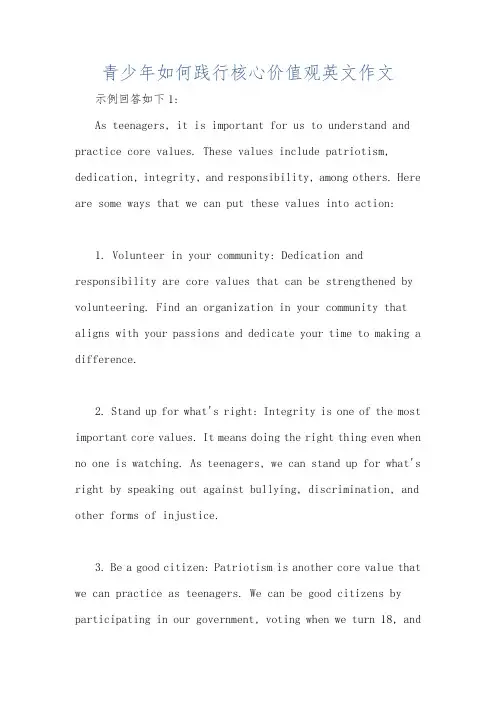
青少年如何践行核心价值观英文作文示例回答如下1:As teenagers, it is important for us to understand and practice core values. These values include patriotism, dedication, integrity, and responsibility, among others. Here are some ways that we can put these values into action:1. Volunteer in your community: Dedication and responsibility are core values that can be strengthened by volunteering. Find an organization in your community that aligns with your passions and dedicate your time to making a difference.2. Stand up for what's right: Integrity is one of the most important core values. It means doing the right thing even when no one is watching. As teenagers, we can stand up for what's right by speaking out against bullying, discrimination, and other forms of injustice.3. Be a good citizen: Patriotism is another core value that we can practice as teenagers. We can be good citizens by participating in our government, voting when we turn 18, andrespecting our country and its symbols.4. Be honest and trustworthy: Honesty is a core value that is essential to building strong relationships. We can practice honesty by being truthful with ourselves and others, admitting our mistakes, and keeping our promises.5. Show respect: Respect is a core value that is important in all aspects of life. We can practice respect by treating others with kindness and empathy, listening to their opinions, and valuing their differences.以上是如何践行核心价值观的几种方式,这些价值包括爱国主义、奉献精神、诚信和责任等。
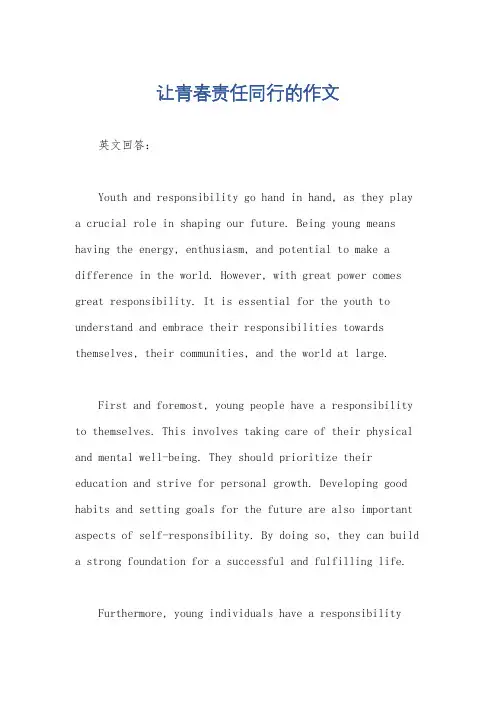
让青春责任同行的作文英文回答:Youth and responsibility go hand in hand, as they play a crucial role in shaping our future. Being young means having the energy, enthusiasm, and potential to make a difference in the world. However, with great power comes great responsibility. It is essential for the youth to understand and embrace their responsibilities towards themselves, their communities, and the world at large.First and foremost, young people have a responsibility to themselves. This involves taking care of their physical and mental well-being. They should prioritize their education and strive for personal growth. Developing good habits and setting goals for the future are also important aspects of self-responsibility. By doing so, they can build a strong foundation for a successful and fulfilling life.Furthermore, young individuals have a responsibilitytowards their communities. They should actively participate in community service and volunteer work. By giving back to society, they can contribute to the betterment of their communities and help those in need. Moreover, they shouldbe responsible citizens by obeying laws, respecting others, and promoting equality and justice.In addition to personal and community responsibilities, young people also have a responsibility towards the environment. They should be aware of the impact of their actions on the planet and strive to make eco-friendly choices. This can include reducing waste, conserving energy, and supporting sustainable practices. By takingresponsibility for the environment, they can contribute toa greener and healthier future.中文回答:青春和责任是紧密相连的,因为它们在塑造我们的未来中起着至关重要的作用。
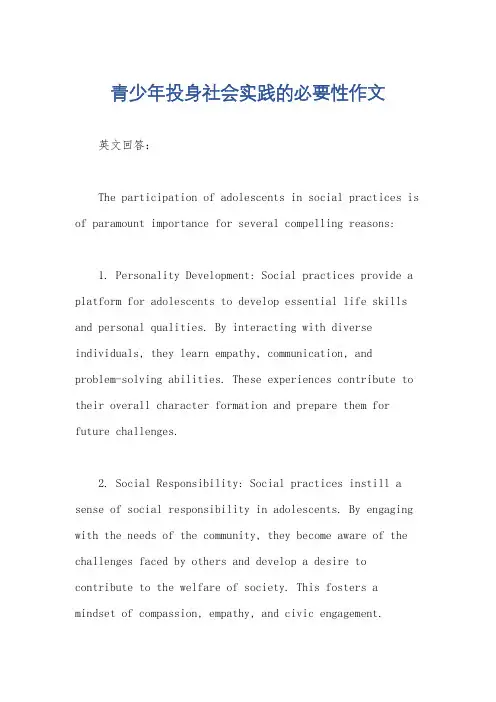
青少年投身社会实践的必要性作文英文回答:The participation of adolescents in social practices is of paramount importance for several compelling reasons:1. Personality Development: Social practices provide a platform for adolescents to develop essential life skills and personal qualities. By interacting with diverse individuals, they learn empathy, communication, and problem-solving abilities. These experiences contribute to their overall character formation and prepare them for future challenges.2. Social Responsibility: Social practices instill a sense of social responsibility in adolescents. By engaging with the needs of the community, they become aware of the challenges faced by others and develop a desire to contribute to the welfare of society. This fosters a mindset of compassion, empathy, and civic engagement.3. Educational Value: Social practices offer a valuable supplement to formal education. They allow adolescents to apply classroom knowledge in real-world settings, reinforce concepts, and develop critical thinking skills. Moreover, they provide opportunities for hands-on learning, experiential knowledge, and problem-based learning.4. Career Exploration: Social practices can help adolescents explore potential career pathways and develop their interests. By participating in various activities, they gain exposure to different fields, learn from professionals, and identify areas where they can leverage their skills and talents. This helps them make informed career decisions in the future.5. Community Engagement: Social practices foster a sense of community engagement in adolescents. They connect them with their peers, local organizations, and the wider social fabric. This engagement promotes cooperation, collaboration, and a sense of belonging, ultimately contributing to a more vibrant and cohesive society.中文回答:青少年积极投身社会实践有着十分重要的意义:1. 促进人格发展,社会实践为青少年提供了发展必备社会技能和人格品质的平台。
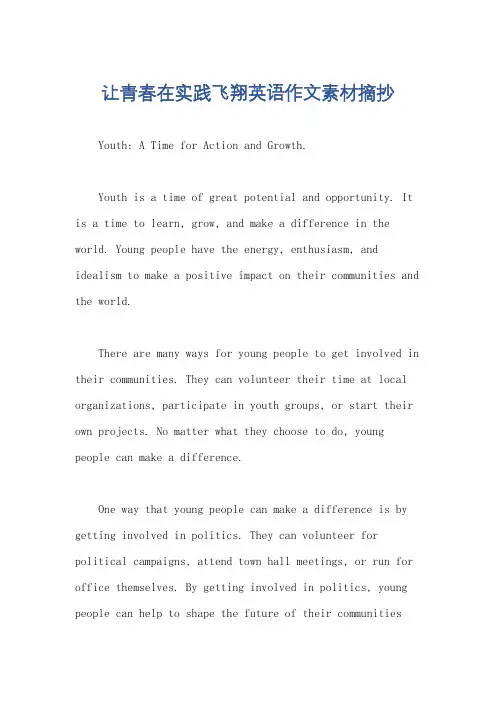
让青春在实践飞翔英语作文素材摘抄Youth: A Time for Action and Growth.Youth is a time of great potential and opportunity. It is a time to learn, grow, and make a difference in the world. Young people have the energy, enthusiasm, and idealism to make a positive impact on their communities and the world.There are many ways for young people to get involved in their communities. They can volunteer their time at local organizations, participate in youth groups, or start their own projects. No matter what they choose to do, young people can make a difference.One way that young people can make a difference is by getting involved in politics. They can volunteer for political campaigns, attend town hall meetings, or run for office themselves. By getting involved in politics, young people can help to shape the future of their communitiesand the world.Another way that young people can make a difference is by getting involved in social justice issues. They can volunteer at soup kitchens, homeless shelters, or other organizations that help those in need. They can also participate in protests and demonstrations to raise awareness of important issues. By getting involved insocial justice, young people can help to make the world a more just and equitable place.Young people can also make a difference by simply being themselves. They can be role models for their peers and show them that it is possible to live a life of purpose and meaning. They can also use their voices to speak out against injustice and inequality. By being themselves, young people can inspire others to make a difference.Youth is a time of great potential and opportunity. It is a time to learn, grow, and make a difference in the world. Young people have the energy, enthusiasm, and idealism to make a positive impact on their communities andthe world. They should seize the opportunity to make a difference and create a better future for themselves andfor generations to come.Here are some examples of how young people have made a difference in the world:Malala Yousafzai is a Pakistani activist who was shot by the Taliban for speaking out in favor of education for girls. She survived and has continued to speak out for the rights of girls and women.Emma Gonzalez is a survivor of the Parkland school shooting who has become a leading voice in the fight for gun control. She has organized protests and rallies and has spoken out against the National Rifle Association.Greta Thunberg is a Swedish environmental activist who has become a leading voice in the fight against climate change. She has organized protests and rallies and has spoken out at the United Nations.These are just a few examples of how young people can make a difference in the world. By getting involved in their communities, getting involved in politics, getting involved in social justice issues, and simply being themselves, young people can make a positive impact on the world.。
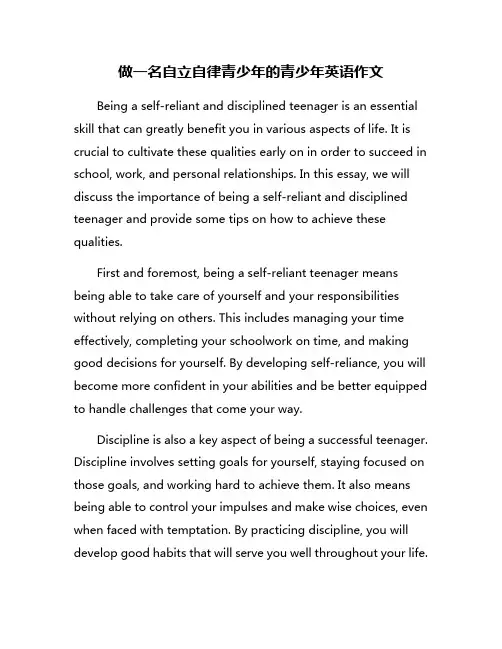
做一名自立自律青少年的青少年英语作文Being a self-reliant and disciplined teenager is an essential skill that can greatly benefit you in various aspects of life. It is crucial to cultivate these qualities early on in order to succeed in school, work, and personal relationships. In this essay, we will discuss the importance of being a self-reliant and disciplined teenager and provide some tips on how to achieve these qualities.First and foremost, being a self-reliant teenager means being able to take care of yourself and your responsibilities without relying on others. This includes managing your time effectively, completing your schoolwork on time, and making good decisions for yourself. By developing self-reliance, you will become more confident in your abilities and be better equipped to handle challenges that come your way.Discipline is also a key aspect of being a successful teenager. Discipline involves setting goals for yourself, staying focused on those goals, and working hard to achieve them. It also means being able to control your impulses and make wise choices, even when faced with temptation. By practicing discipline, you will develop good habits that will serve you well throughout your life.There are several ways to become a more self-reliant and disciplined teenager. One strategy is to set specific, achievable goals for yourself and create a plan to reach them. This could include setting a goal to improve your grades in a particular subject, to learn a new skill, or to save money for a special purchase. By breaking down your goals into smaller steps and tracking your progress, you will be more likely to achieve them.Another important aspect of becoming a self-reliant and disciplined teenager is learning to manage your time effectively. This includes prioritizing your tasks, setting realistic deadlines, and avoiding distractions. By creating a daily schedule and sticking to it, you will be able to make the most of your time and accomplish more in your day.In addition, it is important to cultivate good study habits and work ethic. This includes staying organized, taking thorough notes, and seeking help when needed. By being proactive in your learning, you will not only improve your grades but also develop valuable skills that will serve you well in the future.In conclusion, being a self-reliant and disciplined teenager is a valuable skill that can greatly benefit you in all areas of your life. By setting goals, managing your time effectively, and cultivating good study habits, you will be well on your way to becoming asuccessful and independent young adult. Remember, the habits you develop now will shape your future, so make the effort to become the best version of yourself that you can be.。
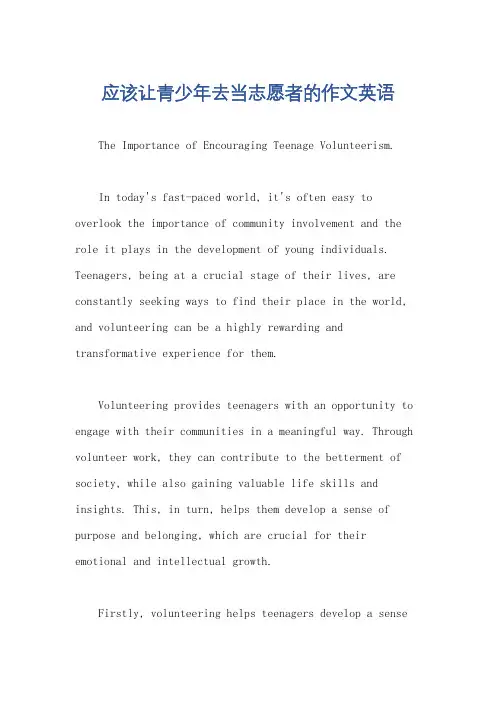
应该让青少年去当志愿者的作文英语The Importance of Encouraging Teenage Volunteerism.In today's fast-paced world, it's often easy to overlook the importance of community involvement and the role it plays in the development of young individuals. Teenagers, being at a crucial stage of their lives, are constantly seeking ways to find their place in the world, and volunteering can be a highly rewarding and transformative experience for them.Volunteering provides teenagers with an opportunity to engage with their communities in a meaningful way. Through volunteer work, they can contribute to the betterment of society, while also gaining valuable life skills and insights. This, in turn, helps them develop a sense of purpose and belonging, which are crucial for their emotional and intellectual growth.Firstly, volunteering helps teenagers develop a senseof empathy and understanding towards others. By workingwith different people from diverse backgrounds, they learnto appreciate the diversity of their communities and the unique challenges faced by different individuals. This, in turn, helps them develop a more tolerant and inclusive mindset, which is essential for building strong communities.Secondly, volunteering provides teenagers withpractical life skills that they can use both in their personal and professional lives. Skills such as teamwork, communication, leadership, and problem-solving are honed through volunteer work, and these skills are invaluable in their future endeavors. Moreover, volunteering also helps teenagers learn the importance of responsibility and commitment, as they are required to fulfill their volunteer duties reliably and consistently.Moreover, volunteering can be a great way for teenagers to explore their interests and passions. By participatingin volunteer projects related to their areas of interest, they can gain valuable experience and insights into their chosen fields. This, in turn, can help them make informeddecisions about their future career paths.Additionally, volunteering can also provide teenagers with a sense of accomplishment and pride. By contributing to society and making a difference in the lives of others, they can feel a sense of fulfillment and satisfaction that is hard to achieve through other means. This sense of accomplishment can help boost their self-esteem and confidence, which are crucial for their overall well-being and success.In conclusion, encouraging teenagers to become volunteers is an investment in their future and the future of society. It helps them develop valuable life skills, a sense of purpose and belonging, and a more tolerant and inclusive mindset. It also provides them with an opportunity to explore their interests and passions while making a positive impact on society. Therefore, we should actively encourage and support teenage volunteerism to foster a more engaged, empathetic, and responsible generation of young leaders.。
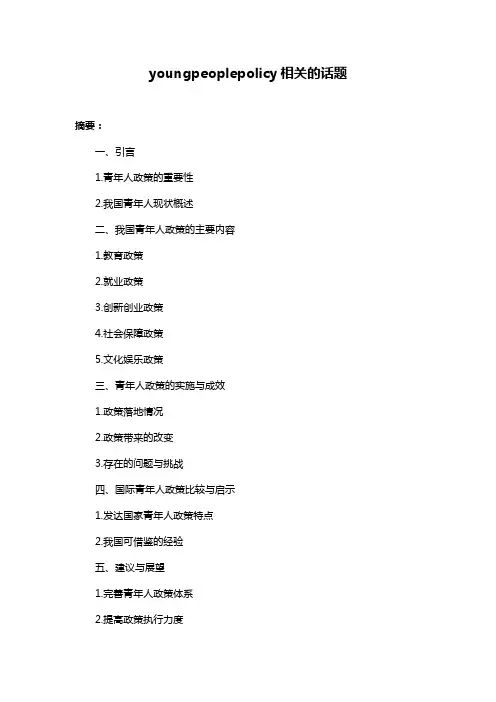
youngpeoplepolicy相关的话题摘要:一、引言1.青年人政策的重要性2.我国青年人现状概述二、我国青年人政策的主要内容1.教育政策2.就业政策3.创新创业政策4.社会保障政策5.文化娱乐政策三、青年人政策的实施与成效1.政策落地情况2.政策带来的改变3.存在的问题与挑战四、国际青年人政策比较与启示1.发达国家青年人政策特点2.我国可借鉴的经验五、建议与展望1.完善青年人政策体系2.提高政策执行力度3.营造有利于青年人发展的社会环境正文:随着社会的发展,青年人作为国家的未来和民族的希望,越来越受到广泛关注。
在我国,青年人政策是一个涉及多领域的综合性体系,旨在为广大青年提供良好的成长环境和发展机会。
本文将从青年人政策的重要性、主要内容、实施与成效、国际比较与启示以及建议与展望五个方面进行阐述。
首先,青年人政策的重要性不容忽视。
青年人是国家的生力军,他们的健康成长和全面发展对于国家的发展具有举足轻重的作用。
因此,制定和实施有针对性的青年人政策,有助于激发青年人的创新活力,提高整个国家的竞争力。
其次,我国青年人现状概述。
当前,我国青年人口规模庞大,占总人口的比重逐年上升。
在教育、就业、创新创业、社会保障、文化娱乐等方面,青年人面临着诸多挑战与机遇。
为应对这些挑战,政府出台了一系列政策。
在教育方面,政府大力推进素质教育,加大对贫困家庭学生的资助力度,促进教育公平。
此外,加大对职业教育投入,培养更多技能型人才,以满足经济社会发展的需求。
在就业方面,政府实施积极的就业政策,鼓励企业吸纳青年人,提供创业指导和服务。
同时,加强职业培训,提高青年人的就业竞争力。
在创新创业方面,政府鼓励青年人创新创业,提供税收优惠、金融支持等政策,为创新创业提供便利条件。
在社会保障方面,政府加大对青年人住房、医疗、养老等方面的保障力度,让他们享有更好的生活品质。
在文化娱乐方面,政府支持青年人参与各类文化活动,丰富他们的精神文化生活。
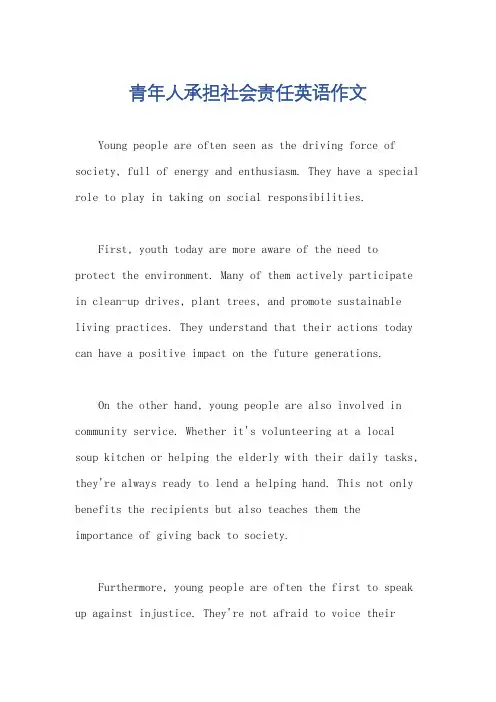
青年人承担社会责任英语作文Young people are often seen as the driving force of society, full of energy and enthusiasm. They have a special role to play in taking on social responsibilities.First, youth today are more aware of the need to protect the environment. Many of them actively participate in clean-up drives, plant trees, and promote sustainable living practices. They understand that their actions today can have a positive impact on the future generations.On the other hand, young people are also involved in community service. Whether it's volunteering at a local soup kitchen or helping the elderly with their daily tasks, they're always ready to lend a helping hand. This not only benefits the recipients but also teaches them the importance of giving back to society.Furthermore, young people are often the first to speak up against injustice. They're not afraid to voice theiropinions on issues like social inequality, discrimination, and exploitation. Their active participation in social movements and protests shows their commitment to making the world a better place.And let's not forget the role of youth in innovation and technology.。
青少年需要培养哪些素质和能力英语作文全文共3篇示例,供读者参考篇1What Qualities and Abilities Should Teenagers Cultivate?As someone in my teenage years, I often find myself pondering the path that lies ahead and the skills I'll need to navigate the challenges of adulthood successfully. The teenage years mark a pivotal period of growth and self-discovery, where we are tasked with honing the qualities and abilities that will shape our future endeavors. In a world that is rapidly evolving, it is crucial for us to cultivate a diverse set of competencies that will enable us to adapt and thrive.One of the most fundamental qualities that every teenager should strive to develop is resilience. Life is filled with obstacles and setbacks, and the ability to bounce back from adversity is a trait that will serve us well throughout our lives. Resilience involves cultivating a growth mindset, where we view challenges as opportunities for learning and personal growth rather than insurmountable barriers. By embracing failure as a temporary setback and maintaining a positive outlook, we can develop themental fortitude to persevere through difficult times and emerge stronger.In addition to resilience, effective communication skills are an indispensable asset for teenagers to cultivate. In our increasingly globalized and interconnected world, the ability to articulate our thoughts and ideas clearly, both verbally and in writing, is paramount. Developing strong communication skills not only enhances our ability to convey our messages effectively but also fosters deeper connections with others and facilitates collaboration. By actively listening, being open to diverse perspectives, and expressing ourselves with clarity and empathy, we can navigate social and professional interactions with greater ease and success.As we navigate the digital age, it is also essential for teenagers to develop proficiency in technology and digital literacy. The rapid pace of technological advancements demands that we stay abreast of emerging trends and possess the ability to adapt to new tools and platforms. By cultivating skills in areas such as coding, data analysis, and digital media creation, we can position ourselves as valuable assets in a world where technology permeates every aspect of our lives. Additionally, developing a critical understanding of digital citizenship, onlinesafety, and ethical considerations surrounding technology is crucial for responsible and effective use of these powerful tools.Furthermore, teenagers should strive to cultivate a spirit of curiosity and a love for lifelong learning. In an era of unprecedented access to information and knowledge, it is essential to develop the ability to seek out new information, critically evaluate sources, and synthesize diverse ideas. By fostering an inquisitive mindset and a thirst for knowledge, we can remain intellectually agile and adaptable, prepared to embrace new challenges and opportunities as they arise.Creativity and innovation are also invaluable qualities for teenagers to nurture. In a rapidly changing world, the ability to think outside the box, generate novel ideas, and approach problems from fresh perspectives will be a distinct advantage. By engaging in creative pursuits, such as art, music, writing, or design, we can exercise our imaginative muscles and develop the confidence to explore unconventional solutions. Additionally, cultivating an entrepreneurial mindset and embracingrisk-taking can unlock new avenues for personal and professional growth.Moreover, fostering emotional intelligence and interpersonal skills is crucial for teenagers as we navigate thecomplexities of social interactions and relationships. Developing self-awareness, empathy, and the ability to manage our emotions effectively can not only enhance our personalwell-being but also strengthen our connections with others. By cultivating active listening skills, conflict resolution strategies, and the capacity to build and maintain healthy relationships, we can create a supportive network that will serve us well throughout our lives.In an increasingly diverse and interconnected world, it is also imperative for teenagers to develop cultural competence and a global perspective. By actively seeking to understand and appreciate different cultures, traditions, and worldviews, we can broaden our horizons and cultivate a deeper sense of empathy and respect for diversity. This not only enriches our personal growth but also equips us with the skills to collaborate effectively with individuals from diverse backgrounds, fostering a more inclusive and harmonious society.Finally, as we navigate the complexities of the modern world, it is essential for teenagers to prioritize personal well-being and develop healthy habits. This includes cultivating practices such as mindfulness, stress management, and self-care routines. By taking care of our mental, physical, and emotional health, we canmaintain the resilience and clarity of mind necessary to tackle life's challenges with confidence and grace.In conclusion, the teenage years present a unique opportunity for personal growth and the development of a robust set of qualities and abilities that will serve as a foundation for success in adulthood. By cultivating resilience, effective communication skills, digital literacy, curiosity, creativity, emotional intelligence, cultural competence, and personalwell-being, we can equip ourselves with the tools necessary to navigate the complexities of the modern world and unlock our full potential. Embracing these diverse competencies will not only enhance our individual journeys but also contribute to building a more compassionate, innovative, and interconnected global community.篇2What Qualities and Abilities Should Teenagers Cultivate?As teenagers, we stand at a pivotal juncture in our lives, poised between the carefree days of childhood and the looming responsibilities of adulthood. It is during this crucial phase that we must actively cultivate the qualities and abilities that will shape our future success and fulfillment. The world we inhabit israpidly evolving, presenting us with challenges and opportunities that our predecessors could scarcely have imagined. To navigate this ever-changing landscape, we must equip ourselves with a diverse array of skills and attributes that will empower us to thrive in the face of adversity and seize the boundless potential that lies ahead.One of the most fundamental qualities that we, as teenagers, must strive to develop is resilience. Life is an inherently unpredictable journey, replete with obstacles and setbacks that can easily derail us if we lack the fortitude to persevere. Resilience is the capacity to bounce back from adversity, to learn from our failures, and to emerge stronger and more resolute than ever before. By cultivating this quality, we equip ourselves with the mental fortitude to weather life's storms and emerge victorious, rather than succumbing to the weight of our challenges.Closely intertwined with resilience is the ability to adapt to change. The world around us is in a constant state of flux, and those who cling rigidly to outdated paradigms and modes of thinking are destined to be left behind. As teenagers, we must embrace the fluidity of our circumstances and develop the agility to pivot and adjust our strategies as the situation demands. Thisadaptability will serve us well not only in our personal lives but also in our future careers, where the ability to anticipate and respond to shifting market trends and technological advancements will be paramount.Furthermore, we must nurture our critical thinking and problem-solving skills. In an age where information is readily available at our fingertips, the true challenge lies not in accumulating knowledge but in discerning fact from fiction, separating the signal from the noise, and synthesizing disparate pieces of information into coherent and actionable insights. By honing our analytical abilities, we can navigate the complexities of the modern world with greater clarity and efficiency, making informed decisions that align with our values and goals.Equally vital is the cultivation of effective communication skills. In an increasingly interconnected and globalized world, the ability to articulate our thoughts and ideas with clarity and precision is invaluable. Whether we are crafting a compelling presentation, negotiating a business deal, or simply engaging in meaningful discourse with our peers, strong communication skills will enable us to forge deeper connections, foster understanding, and persuade others to embrace our vision.Beyond these fundamental skills, we must also strive to develop a diverse array of practical abilities that will serve us well in our future endeavors. For those inclined towards entrepreneurship or business, fostering financial literacy and an understanding of economics will be essential. Those drawn to the realms of science and technology may wish to hone their coding and computational skills, positioning themselves at the forefront of the digital revolution. And for those with artistic leanings, refining our creative expression and developing our aesthetic sensibilities will be paramount.Yet, while these practical skills are undoubtedly valuable, we must be careful not to neglect the cultivation of our emotional intelligence and interpersonal skills. In an increasingly collaborative and team-oriented world, the ability to empathize with others, manage our emotions effectively, and navigate complex social dynamics will be indispensable. By developing these "soft skills," we can cultivate more meaningful relationships, build stronger support networks, and ultimately achieve greater personal and professional fulfillment.Moreover, as we grapple with the myriad challenges facing our generation – from climate change and environmental degradation to social inequalities and political polarization – it isimperative that we nurture a sense of global citizenship and social responsibility. We must strive to understand the intricate interconnections that bind us all together, transcending borders and embracing the rich tapestry of human diversity. By cultivating a deep respect for other cultures and perspectives, we can foster greater empathy, compassion, and understanding, ultimately paving the way for a more just, equitable, and sustainable world.Underpinning all of these qualities and abilities must be a steadfast commitment to lifelong learning and personal growth. The world is changing at an unprecedented pace, and the skills and knowledge that serve us well today may become obsolete tomorrow. As such, we must embrace a mindset of intellectual curiosity and continuous self-improvement, ever eager to expand our horizons, challenge our assumptions, and adapt to the evolving demands of the future.In essence, the qualities and abilities that we must cultivate as teenagers are multifaceted and far-reaching. We must strive to develop resilience, adaptability, critical thinking, effective communication, practical skills, emotional intelligence, global citizenship, and a thirst for lifelong learning. By nurturing these diverse attributes, we can position ourselves to navigate thecomplexities of the modern world with confidence and grace, seizing the boundless opportunities that lie ahead and contributing meaningfully to the betterment of society.The path before us is not an easy one, but it is a journey that we must embrace with open hearts and steadfast determination. For it is in the crucible of our youth that the foundations of our future are forged, and the choices we make today will echo throughout the years to come. Let us embrace this challenge with enthusiasm and vigor, ever mindful of the immense potential that lies within each and every one of us. The future belongs to those who are willing to cultivate the qualities and abilities that will propel them towards greatness, and it is our solemn duty to ensure that we are numbered among them.篇3What Qualities and Abilities Should Teenagers Cultivate?As teenagers, we're at a pivotal stage in our lives, transitioning from childhood to adulthood. The choices we make and the habits we form during these formative years can profoundly impact our future success and well-being. Therefore, it's crucial that we consciously cultivate certain qualities and abilities that will not only help us navigate the challenges ofadolescence but also prepare us for the complexities of the adult world.One of the most fundamental qualities we need to develop is resilience. The teenage years can be tumultuous, with emotional upheavals, peer pressure, academic stress, and a myriad of other challenges. Resilience is the ability to bounce back from adversity, to adapt to change, and to persevere in the face of obstacles. By cultivating resilience, we can better cope with the inevitable setbacks and disappointments that life throws our way, and emerge stronger and more capable.Closely tied to resilience is emotional intelligence. As we navigate the rollercoaster of hormones and emotions that characterize adolescence, it's essential that we learn to recognize, understand, and manage our emotions effectively. Emotional intelligence involves being self-aware, empathetic, and able to regulate our feelings in a healthy manner. By developing this quality, we can build stronger relationships, communicate more effectively, and make better decisions, both in our personal and professional lives.Another crucial ability we should strive to cultivate is critical thinking. In today's world, we're bombarded with an overwhelming amount of information from various sources, notall of which are reliable or accurate. Critical thinking skills enable us to analyze information objectively, evaluate evidence, and make informed decisions. By developing a questioning and analytical mindset, we can navigate the complexities of the modern world more effectively and avoid falling prey to misinformation, biases, or unsubstantiated claims.As global citizens, we also need to cultivate cultural awareness and appreciation for diversity. The world is becoming increasingly interconnected, and we're likely to interact with people from diverse backgrounds and cultures throughout our lives. By developing an understanding and respect for different cultures, beliefs, and perspectives, we can foster greater empathy, tolerance, and cross-cultural communication skills. These qualities will not only enrich our personal experiences but also benefit us in our future careers and social interactions.In the rapidly evolving technological landscape, it's essential that we cultivate digital literacy and adaptability. Technology is transforming every aspect of our lives, from the way we communicate and access information to the way we work and learn. By becoming proficient in the use of digital tools and platforms, and by embracing a mindset of continuous learningand adaptation, we can stay relevant and competitive in an ever-changing job market.Furthermore, we should strive to develop leadership skills and a sense of social responsibility. As the future leaders and decision-makers of society, we need to cultivate the ability to inspire and motivate others, communicate effectively, and make ethical and responsible choices. By developing a sense of social responsibility, we can contribute positively to our communities and work towards creating a better world for everyone.Finally, it's crucial that we cultivate perseverance,self-discipline, and a growth mindset. Success in any endeavor rarely comes easily; it requires sustained effort, dedication, and a willingness to learn from failures and setbacks. By developing perseverance and self-discipline, we can overcome obstacles and achieve our goals, whether academic, personal, or professional. A growth mindset, which embraces challenges as opportunities for growth and learning, will allow us to continuously improve and reach our full potential.In conclusion, as teenagers, we have a unique opportunity to shape our future by cultivating a range of essential qualities and abilities. By developing resilience, emotional intelligence, critical thinking, cultural awareness, digital literacy, leadership skills,social responsibility, perseverance, self-discipline, and a growth mindset, we can navigate the complexities of the modern world more effectively, build fulfilling personal and professional lives, and contribute positively to society. It's up to us to embrace this challenge and make the most of our formative years, laying the foundation for a successful and meaningful future.。
倡议书英语作文提高青少年社会实践能力全文共3篇示例,供读者参考篇1Enhancing Youth Social Practice Capabilities: A Call to ActionAs students navigating the complexities of modern society, we cannot underestimate the significance of developing robust social practice abilities. These competencies go beyond academic prowess, transcending the confines of classrooms and textbooks, and enabling us to engage with the world around us in a meaningful and impactful manner. It is imperative that we, the youth, actively cultivate these skills to better contribute to our communities, drive positive change, and prepare ourselves for the challenges that lie ahead.What exactly are social practice abilities, and why are they so crucial? These encompass a broad spectrum of interpersonal, problem-solving, and leadership skills that empower us to navigate real-world scenarios, collaborate effectively, and create tangible solutions to societal issues. They involve the ability to communicate effectively, think critically, empathize with diverseperspectives, and take initiative in addressing the needs of our communities.One of the primary benefits of enhancing our social practice abilities is the opportunity to foster a deeper connection with the world around us. By engaging in practical, hands-on experiences, we can develop a more profound understanding of the intricate dynamics that shape our societies. Whether it's volunteering at a local shelter, participating in community outreach programs, or collaborating on environmental initiatives, these experiences allow us to step out of our comfort zones and confront the complexities of real-world challenges.Furthermore, cultivating social practice abilities prepares us for the ever-evolving demands of the professional realm. In today's globalized and interconnected world, employers seek individuals who possess not only academic credentials but also the ability to work collaboratively, think critically, and adapt to diverse environments. By honing these skills, we increase our competitiveness in the job market and position ourselves for success in our future careers.However, enhancing social practice abilities is not solely about personal gain; it is also a catalytic force for positive social change. By actively engaging with our communities, we canidentify areas of need, collaborate with stakeholders, and implement innovative solutions to address pressing issues. Whether it's tackling environmental degradation, promoting social justice, or advocating for educational reform, our collective efforts as socially conscious individuals can drive transformative change.To truly embrace the importance of social practice abilities, we must recognize the limitations of traditional educational systems. While academic institutions undoubtedly play a vital role in imparting knowledge and fostering intellectual growth, they often fall short in providing practical, experiential learning opportunities. It is our responsibility, as proactive learners, to seek out avenues for personal and professional development beyond the confines of the classroom.One effective way to enhance our social practice abilities is through structured internship programs, service-learning initiatives, and community engagement projects. These platforms offer invaluable opportunities to apply theoretical knowledge in real-world settings, develop problem-solving skills, and cultivate a sense of civic responsibility. By immersing ourselves in these experiences, we not only gain practical skillsbut also develop a deeper appreciation for the complexities of societal challenges.Moreover, we must embrace the power of collaboration and seek out mentors and role models who can guide us on this journey. By connecting with experienced professionals, community leaders, and changemakers, we can learn from their wisdom, gain insights into effective strategies, and forge meaningful connections that can propel us towards achieving our goals.In addition to formal programs and mentorship opportunities, we should also explore avenues for self-directed learning and personal growth. This could involve participating in local initiatives, attending workshops or conferences, or engaging in independent research projects that align with our interests and passions.Undoubtedly, enhancing our social practice abilities is a collective responsibility that requires the support and cooperation of various stakeholders. Educational institutions must prioritize the integration of experiential learning opportunities into their curricula, fostering an environment that encourages practical skill development alongside academic pursuits. Community organizations and businesses shouldactively collaborate with educational institutions, providing platforms for internships, service-learning projects, andhands-on experiences.Furthermore, policymakers and government bodies must recognize the importance of social practice abilities and implement policies that promote and incentivize such initiatives. This could involve providing funding for community outreach programs, establishing partnerships with educational institutions, and creating frameworks that facilitate meaningful civic engagement.As we navigate the complexities of the 21st century, it is evident that social practice abilities are not merely supplementary skills but essential competencies that empower us to thrive in an ever-changing world. By actively cultivating these abilities, we not only enhance our personal and professional prospects but also contribute to the betterment of our communities and societies.Let us embrace this call to action and collectively strive to enhance our social practice capabilities. Through a concerted effort involving educational institutions, community organizations, policymakers, and ourselves as proactive learners, we can shape a future where our youth are equipped with thetools to drive positive change, tackle global challenges, and create a more just, equitable, and sustainable world.篇2Enhancing Social Practice Skills for Today's YouthAs a student, I believe it is crucial for young people to develop strong social practice abilities alongside their academic pursuits. Social practice skills refer to the competencies needed to navigate and positively contribute to society, such as communication, problem-solving, teamwork, and civic engagement. While academic knowledge is undoubtedly important, it is not enough to prepare us for the challenges and responsibilities we will face in the real world.The ability to effectively communicate is perhaps the most fundamental social practice skill. In today's interconnected world, we must be able to articulate our thoughts and ideas clearly and respectfully, whether in written or verbal form. This skill is essential not only in professional settings but also in our personal relationships and everyday interactions. Effective communication fosters understanding, resolves conflicts, and enables collaboration.Problem-solving is another critical social practice skill that should be nurtured in youth. As we enter adulthood, we will inevitably encounter various challenges and obstacles, both personal and societal. Developing the ability to analyze situations objectively, think critically, and devise creative solutions will empower us to tackle these challenges head-on. Problem-solving skills not only enhance our resilience but also contribute to the collective progress of society.Teamwork and collaboration are also essential social practice abilities. In our increasingly globalized world, we must learn to work effectively with people from diverse backgrounds and perspectives. Embracing teamwork teaches us to value different viewpoints, negotiate, and leverage the strengths of each team member for a common goal. These skills are invaluable in both professional and community settings, as they foster a sense of shared responsibility and collective achievement.Civic engagement is another critical aspect of social practice that should be emphasized for youth. As future leaders and active members of society, we must develop a sense of civic responsibility and a commitment to positively impacting our communities. This can involve volunteering, participating in localgovernment processes, or advocating for social and environmental causes. Civic engagement not only nurtures a sense of community but also equips us with the skills to effect meaningful change.Undoubtedly, academic knowledge remains crucial in preparing us for future careers and intellectual pursuits. However, without robust social practice abilities, our academic achievements may fall short in translating to real-world success and personal fulfillment. By prioritizing the development of these essential skills alongside our academic endeavors, we can become well-rounded individuals better equipped to navigate the complexities of modern society.Integrating social practice skill development into the educational curriculum is a crucial step towards achieving this goal. Educators can incorporate project-based learning, group assignments, and community service opportunities to foster communication, teamwork, and civic engagement. Additionally, dedicated courses or workshops on topics such as public speaking, conflict resolution, and critical thinking can provide structured training in these vital areas.Beyond the classroom, extracurricular activities and community involvement can also serve as valuable platforms forhoning social practice abilities. Participating in student organizations, volunteering, or engaging in youth leadership programs can provide hands-on experiences that cultivate these crucial skills in real-world settings.Furthermore, it is essential to recognize and celebrate the value of social practice skills alongside academic achievements. By acknowledging and rewarding students who demonstrate exceptional communication, problem-solving, teamwork, or civic engagement abilities, we can reinforce the importance of these competencies and inspire others to prioritize their development.In conclusion, enhancing social practice abilities for today's youth is a paramount endeavor. While academic knowledge is vital, it is not sufficient to navigate the complexities of our rapidly evolving world. By emphasizing the development of communication, problem-solving, teamwork, and civic engagement skills, we can empower young people to become well-rounded, socially responsible, and impactful members of society. It is our collective responsibility – educators, parents, and community members – to prioritize the cultivation of these essential abilities, ensuring that our youth are equipped to tackle the challenges of the present and shape a better future for all.篇3Enhancing Youth's Social Practice Abilities: A Rallying CallAs students, we are often consumed by the rigors of academic pursuits, diligently studying subjects within the confines of classrooms and libraries. However, education extends far beyond the realm of textbooks and lectures. It is an endeavor that should equip us with the necessary skills to navigate the complexities of the world beyond school walls. In this regard, fostering social practice abilities among youth is of paramount importance, enabling us to contribute positively to society and thrive in our future endeavors.Social practice, as the term implies, refers to the application of knowledge and skills in real-world settings, engaging with diverse communities, and addressing societal challenges. It is through this immersive experience that we can truly understand the intricacies of human interactions, develop empathy, and cultivate a sense of civic responsibility.The benefits of enhancing social practice abilities among youth are multifaceted and far-reaching. Firstly, it fosters personal growth and character development. By stepping out of our comfort zones and engaging in meaningful interactions with others, we gain invaluable insights into different perspectives, cultures, and ways of life. This exposure broadens our horizons,challenges our preconceived notions, and nurtures a spirit of open-mindedness and tolerance – qualities essential for thriving in an increasingly globalized world.Furthermore, social practice equips us with crucial life skills that extend beyond academic knowledge. Communication, problem-solving, teamwork, and adaptability are just a few of the competencies that are honed through practical experiences. These transferable skills not only enhance our employability but also contribute to our overall success in personal and professional endeavors.Additionally, engaging in social practice fosters a sense of civic responsibility and community engagement. By actively participating in initiatives that address societal challenges, we develop a deeper understanding of the intricate web of issues affecting our communities. This heightened awareness empowers us to be agents of positive change, driven by a desire to create a more equitable and sustainable world.Despite the numerous benefits, it is disheartening to witness the lack of emphasis on social practice opportunities within many educational systems. Too often, the focus is solely on academic achievement, with little consideration for the development of practical, real-world skills. This imbalance notonly hinders personal growth but also perpetuates a disconnect between the classroom and the realities of society.To address this issue, we must advocate for a comprehensive approach to education that incorporates social practice as an integral component. Schools and educational institutions should collaborate with local organizations, businesses, and community groups to create meaningful opportunities for students to engage in practical experiences. These could range from volunteering initiatives and internships to community service projects and entrepreneurial endeavors.Moreover, it is imperative to recognize and celebrate the accomplishments of students who excel in social practice activities. By acknowledging and valuing these achievements alongside academic accomplishments, we can cultivate a culture that embraces the holistic development of individuals.Lastly, we must empower ourselves as students to actively seek out and pursue social practice opportunities. While institutional support is crucial, we must also take personal responsibility for our growth and development. By stepping outside our comfort zones, embracing new challenges, and engaging with diverse communities, we can cultivate theinvaluable social practice abilities that will serve us well throughout our lives.In conclusion, enhancing social practice abilities among youth is not merely a noble endeavor; it is a necessity for our personal growth, societal progress, and the betterment of our collective future. By advocating for a comprehensive approach to education that integrates practical experiences, we can foster a generation of individuals who are not only academically proficient but also socially conscious, adaptable, and equipped with the tools to navigate the complexities of the world.Let us embrace this rallying call, recognizing that education is not confined to the walls of a classroom but extends into the vibrant tapestry of society itself. Together, we can cultivate a future where knowledge and practical application converge, empowering us to be catalysts for positive change and shaping a world that is more just, compassionate, and sustainable.。
引领青年的实践路径下载温馨提示:该文档是我店铺精心编制而成,希望大家下载以后,能够帮助大家解决实际的问题。
文档下载后可定制随意修改,请根据实际需要进行相应的调整和使用,谢谢!并且,本店铺为大家提供各种各样类型的实用资料,如教育随笔、日记赏析、句子摘抄、古诗大全、经典美文、话题作文、工作总结、词语解析、文案摘录、其他资料等等,如想了解不同资料格式和写法,敬请关注!Download tips: This document is carefully compiled by the editor. I hope that after you download them, they can help yousolve practical problems. The document can be customized and modified after downloading, please adjust and use it according to actual needs, thank you!In addition, our shop provides you with various types of practical materials, such as educational essays, diary appreciation, sentence excerpts, ancient poems, classic articles, topic composition, work summary, word parsing, copy excerpts,other materials and so on, want to know different data formats and writing methods, please pay attention!引领青年的实践路径是当前社会中一个备受关注的话题。
作为青少年如何为国家发展做贡献英语作文English: As teenagers, we can contribute to our country's development in various ways. Firstly, we can excel in our studies and equip ourselves with knowledge and skills that can be beneficial to our nation. We can strive for academic excellence to become future leaders, scientists, innovators, and professionals who can contribute to the advancement of our country. Additionally, we can actively participate in volunteer work and community service, which can help address social issues and improve the well-being of our fellow citizens. By engaging in environmental protection initiatives, advocating for sustainable practices, and promoting awareness about important issues, we can also contribute to the overall development and prosperity of our country. Moreover, as young citizens, we can also engage in political participation by staying informed, exercising our rights, and advocating for policies and initiatives that can positively impact our country's development.Translated content: 作为青少年,我们可以通过多种方式为国家的发展做出贡献。
青少年如何做来实现少年强英语作文初中English:To achieve proficiency in English writing in junior high school, teenagers can take several effective steps. Firstly, it is crucial to immerse oneself in the English language by reading English books, articles, and news, and watching English movies and TV shows regularly. This exposure to authentic English materials can help teenagers improve their vocabulary, grammar, and writing style. Secondly, practicing writing in English is essential. Teenagers can start by writing short essays, journals, or even creative stories in English on a regular basis. They can also seek feedback from teachers or peers to identify areas for improvement. Additionally, participating in English writing competitions or joining English clubs at school can provide valuable opportunities for teenagers to enhance their writing skills and receive guidance from experienced writers. Moreover, utilizing online resources such as writing prompts, grammar checkers, and language exchange platforms can further support teenagers in improving their English writing. Finally, it is important for teenagers to stay motivated and persistent in their efforts to improve their English writing. Setting specific goals,celebrating small achievements, and finding enjoyment in the process can help teenagers stay committed to their language learning journey.中文翻译:为了在初中实现少年强英语作文,青少年可以采取几种有效的步骤。
2025届高考英语写作素材积累之青少年志愿服务与社会责任清单一、相关词汇1. Volunteer Service / Voluntary Work 志愿服务2. Social Responsibility 社会责任3. Teenagers / Young People 青少年4. Community 社区5. Help the Needy 帮助有需要的人6. Make a Difference 产生影响7. Contribute to Society 为社会做出贡献8. Charitable Activities 慈善活动9. Environmental Protection 环境保护10. Care for the Elderly 关爱老人11. Support the Disadvantaged 支持弱势群体12. Promote Social Justice 促进社会公正13. Civic Awareness 公民意识14. Teamwork 团队合作15. Leadership Skills 领导能力二、相关句子1. Teenagers should actively participate in volunteer service to develop asense of social responsibility.青少年应该积极参与志愿服务,培养社会责任感。
2. By engaging in voluntary work, young people can make a positive difference in the community.通过参与志愿工作,年轻人可以为社区带来积极的改变。
3. Volunteering not only helps others but also enriches our own lives.志愿服务不仅帮助他人,也丰富了我们自己的生活。
4. Young people have the responsibility to care for the environment and promote sustainable development.年轻人有责任关爱环境,促进可持续发展。
MA Community and Youth Work
2007-08
Name of Module: Youth Policy and Practice
Weighting: 15 Credits
Tutor(s): Jean Spence and Tony Jeffs
Module Outline
The module will provide an opportunity for students to examine critically: •youth policy in the UK;
•the origins and development of youth work including the significance of imperialism and gender;
•theories of youth work including understanding of difference;
•the funding and management of youth work;
•key forms of intervention i.e. centre-based work, detached and outreach work, issue-based work, specialist practice focussed on specific cohorts of young people: young women, young black people, young lesbian and gay people.
Learning Outcomes
By the end of the module students should be able to demonstrate: •knowledge and critical understanding of the key theoretical approaches and models of practice in youth work;
• a systematic understanding and critical awareness of issues that are central to youth policy and youth work practice;
•knowledge and critical understanding of the ideological and political determinants that have shaped youth policy.
Teaching and Learning Methods
Individual and group tutorials, group discussion, practical exercises, study groups, case studies and reflective recordings, independent reading and the assessment of written work.
Assessment of Learning Outcomes
Summative Assessment: One essay (3000 words)
Formative Assessment: Group Presentation
Indicative Reading
Davies, B. (1999) History of the Youth Service in England Vol. (1) and (2), Leicester,Youth Work Press.
Furlong, A., & Cartmel, F. (1997) Young People and Social Change, Open University Press.
Gilchrist, R., Jeffs, T., & Spence, J. (eds) (1997) Essays on the History of Youth and Community Work, Youth Work Press.
Gilchrist, T., Jeffs. T., & Spence, J. (eds) (2003) Architects of Change: Studies in the History of Community and Youth Work, Leicester, NYA.
** Jeffs, T., & Smith, M. (1999) Informal Education, Education Now Books.
Miles, S. (2000) Youth Lifestyles in a Changing World, Open University Press. ** Mizen, P. (2004) The Changing State of Youth, Palgrave
Spence, J. and Devanney, C. with Noonan, K. (2007) Youth Work: Voices of Practice, Leicester, National Youth Agency
Smith, M. (1988) Developing Youth Work, Open University Press.。